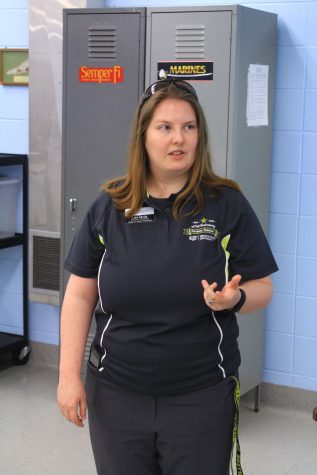Student refurbishes hopes, dreams, of neglected children in Guatemala
The summer is a great time for college students to make money, catch up on rest, go on vacations, or take classes to get ahead on schoolwork, but Hailey Stine decided to use her summer to help those less fortunate.
Stine, a senior in international studies and Spanish at Wichita State, volunteered for six weeks in Guatemala working with Eagle’s Nest orphanage.
“My dad went down there in 1991 and actually built the original orphanage in Shela, about an hour and a half from where they are now, (Sololá).” Stine said. “I knew the people who owned it and my brother went last year with his school. It was kind of like one door opened after another and I was able to go.”
Eagle’s Nest is an organization that was started by missionaries at Stine’s church.
“The place where they are now was a bankrupt timeshare, so it has a swimming pool and a big cabana,” Stine said. “They rebuilt this and made it an orphanage.”
Guatemala has the highest rate of chronic malnutrition in children less than 5 in all of Latin America, according to savethechildren.org.
In an average orphanage in Guatemala there can be more than 900 children in a government-run home, and it’s usually filled with a lot of abuse and neglect.
“There is such a problem right now with children and their parents, whether their parents don’t want them or can’t take care of them anymore, so a lot of parents put their children in government homes,” Stine said.
“These kids that I am working with are very lucky to be where they are.”
The government calls Eagle’s Nest whenever it finds children in need of a place to live, or the children find the orphanage themselves.
“There was a 15-year-old girl who came to our door at 2 a.m. saying her aunt was trying to prostitute her out,” Stine said. “Two kids were sent to us because their mother wouldn’t let them inside the house unless they made a certain amount of money that day.”
Stine lived in an apartment in the basement of the orphanage, and took care of the kids during the day as a “momma.” Each momma stays with the kids, feeds and bathes them, and makes sure they are doing their homework and chores.
Every other day she would work in the school, teaching English, using music and dance.
In rural Guatemala, many children (particularly girls) do not complete their basic education, speak only their native Mayan language, and grow up functionally illiterate, savethechildren.org said.
Stine also answered phones for the orphanage every other morning.
“I learned you can do more than what you think you can, like I translated a lot, and they told me the best way to learn is you just got to do it,” she said. “I lived in a home where the two women spoke no English whatsoever so I really had to learn.”









